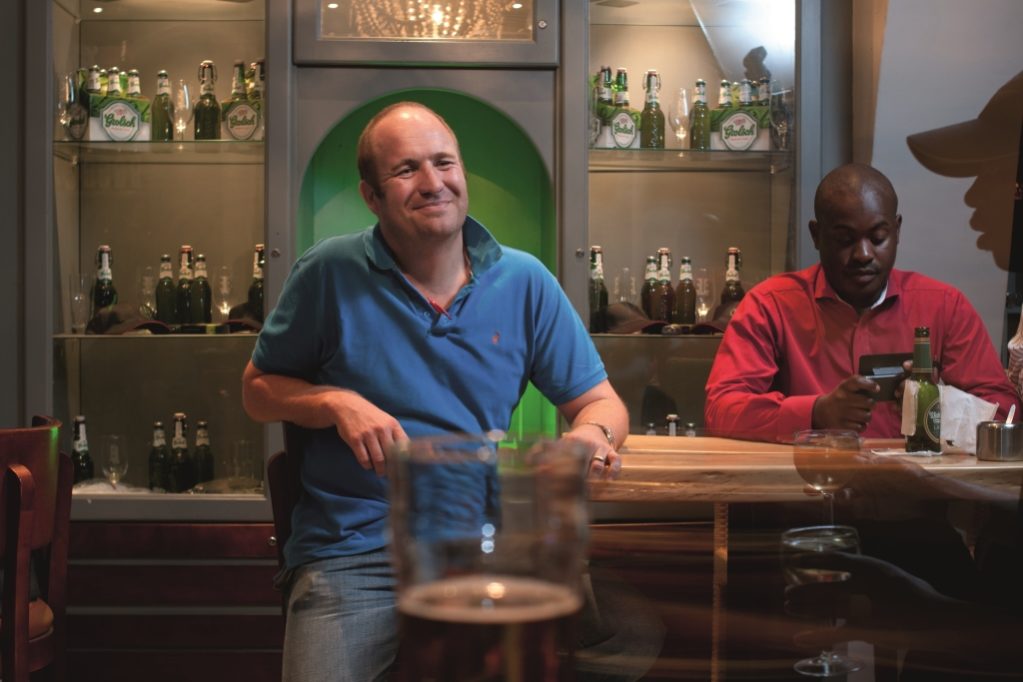Just over the road from the newest bank in Mozambique, a would-be tycoon was nurturing his dream to the clatter of knives, forks and glasses. It was a warm, busy Maputo night in a packed Mundos, on Julius Nyerere Avenue; Portuguese football giants, Benfica, played Manchester United on television.

Mundo’s owner Albert Hechter, Maputo, Mozambique; 14 September 2011 – Photo by Brett Eloff.
The tray-bearing waiters waltzed through the crowded bar with a fleet-footedness worthy of Wayne Rooney; the cold beer flowed down scores of throats with the ease of Ashley Young gliding down the wing. It ought to: this bar is the biggest retailer of beer in Mozambique selling 15,000 liters a month. In the middle of it all, the ready grin of mine host, Albert Hechter, a man who risked all 20 years ago and reaped a fortune.
“I could sell it for a million dollars now, but I won’t,” says Hechter breezily through the cackle of carousing patrons. It’s an entrepreneurial story that began in 1990 in the last days of a bitter civil war in Mozambique. Hechter arrived in the country to work in a hotel and left with an idea. “There weren’t even any cars on the road in Maputo in those days. But also, there were no restaurants or takeaways either,” says Hechter.
Towards the end of 1991, Hechter scraped together R15,000 ($1,900) in South Africa to buy two hot dog vans and drove north for the border. It was a huge step for Hechter, an Afrikaner from conservative Pretoria—a city where a big trip was a night out in Johannesburg. “Everyone thought I was mad! The war was still on in Mozambique. But I was 20 years old and had big balls.”
Loading...
On arrival in Maputo, he parked one hot dog van on the beachfront and the other in Kenneth Kaunda Avenue, near to the foreign embassies. Sure enough, the idea bore fruit and within weeks there were snaking queues along the beach and around the embassies. Diplomats tore themselves away from foreign affairs to send their drivers to buy the only hot dog with mustard in Mozambique.
A year later, Hechter borrowed R70,000 ($8,900) from his dad in Pretoria to buy a snack bar in downtown Maputo—the forebear of Mundos. These were busy and lucrative times for those who had the wherewithal to put up any form of refreshment or entertainment in bleak post war Maputo. The city may have been a rundown shadow of itself, but UN peacekeeping troops were in town and the US dollars swirled like a cloud of confetti around sparse entertainment hot spots. Hechter made a little pile and in 1994 left Mozambique to go traveling for a year. He arrived back in South Africa, just in time see his country win the 1995 Rugby World Cup, but found the bite of the Mozambique business bug as hard to shrug off as a Maputo mosquito.
So, by 1996, he was back in Maputo to build a new Mundos, this time on Julius Nyerere Avenue, in a building rented from the Catholic Church. He started with 40 seats and in 15 years, he has built it into a thriving watering hole with 370 seats. Every night, tourists, diplomats, businesspeople, pilots, engineers, soldiers, ex-soldiers and aid workers rub shoulders at the bar; you don’t have to enjoy a drink to enjoy the atmosphere, but it helps. In Mundos, I once met an English accent educated direct descendant of Archduke Franz Ferdinand—the Austrian heir to the throne whose assassination in Sarajevo sparked World War I. I pointed out that many of my family had perished in that war.
“Oh, I am terribly sorry about that,” he said in a very cut glass English accent. We both laughed. You see what I mean about drink. The bar used to be full of South Africans and expats from New York to Nigeria, but times are changing fast. Hechter reckons 80% of his customers are now middleclass Mozambicans with money to spend. “Most South Africans I see here now are builders looking for work.”
Above the din of the crowded bar, he said the recession appears to have passed Maputo by. “You go into the bars in Maputo and they are still packed. People in Mozambique don’t have the car and health payments that, say, South Africans do, so people have money to spend. The city is booming, rents are going up to between $3,000 and $4,000 a month. It is almost back to the days of UNiMOZ (when United Nations troops packed the city and paid premium rents). There are five construction cranes within one kilometer of this bar.” For the affable Hechter, the blue sky, over the palm fringed Maputo Harbor, is the limit as far as Mozambique’s economic fortunes are concerned.
His wife and children live over the border in South Africa, in Nelspruit, and he divides his time between Maputo and home—leading to the inevitable question over whether the next generation of the Hechters will be charging over the border into the exhilarating, heady uncertainty of Mozambique’s dynamic emerging economy. “I wouldn’t allow my kids to do it,” says Hechter with that wide smile that sold a million beers in Mozambique.
Loading...
